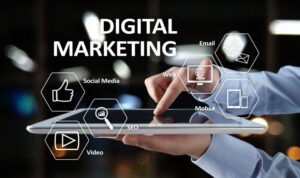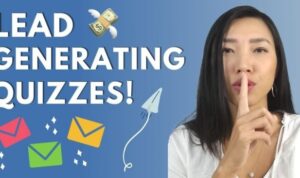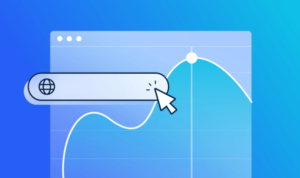Understanding Sales Funnels opens the door to a world where leads turn into loyal customers. Get ready for a rollercoaster ride of marketing insights and strategies that will blow your mind.
Get ready to dive deep into the realm of sales funnels and unlock the secrets to boosting your conversion rates like never before.
Introduction to Sales Funnels
A sales funnel is like the roadmap for turning potential customers into paying ones. It’s a crucial tool in marketing that helps businesses guide leads through a series of steps to eventually make a purchase.
Different Stages of a Typical Sales Funnel
Here’s a breakdown of the typical stages:
- 1. Awareness: This is where potential customers become aware of your product or service.
- 2. Interest: Customers show interest in what you offer and want to learn more.
- 3. Decision: Customers are considering making a purchase and are evaluating their options.
- 4. Action: The final stage where customers make the purchase and become paying customers.
How Sales Funnels Help Businesses Convert Leads into Customers
Sales funnels are designed to streamline the customer journey and make it easier for businesses to convert leads into customers. By guiding customers through each stage of the funnel, businesses can address their needs and concerns, ultimately increasing the chances of a successful conversion.
Types of Sales Funnels: Understanding Sales Funnels
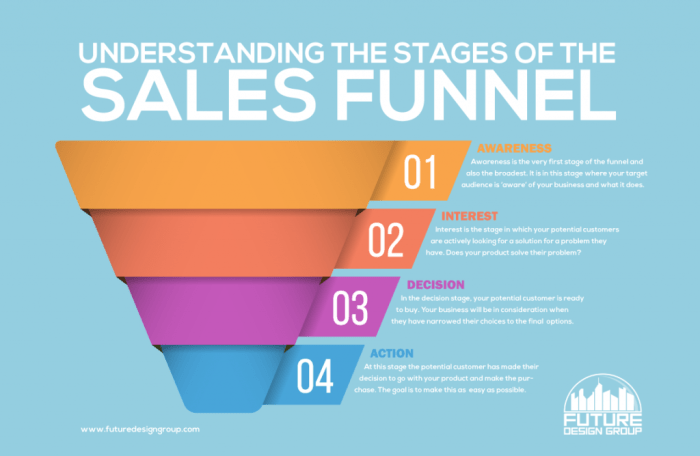
When it comes to sales funnels, there are various types tailored to different business needs and goals. Each type serves a specific purpose and is structured to guide potential customers through the buying process effectively.
Lead Generation Funnels
Lead generation funnels are designed to capture leads and convert them into potential customers. They focus on providing valuable content or incentives in exchange for contact information. These funnels typically include landing pages, opt-in forms, and lead magnets to attract and nurture leads.
Sales Funnels for E-commerce
E-commerce sales funnels are specifically crafted for online stores to drive conversions and increase sales. These funnels often include product pages, upsell and cross-sell opportunities, and checkout processes optimized for a seamless shopping experience. By guiding visitors through the stages of awareness, interest, desire, and action, e-commerce sales funnels aim to maximize revenue.
Webinar Funnels
Webinar funnels are centered around hosting webinars to educate, engage, and sell to participants. These funnels typically involve registration pages, email sequences to promote the webinar, the live webinar event, and follow-up sequences to convert attendees into customers. Webinar funnels are effective for businesses looking to establish authority in their industry and showcase their expertise.
Examples of Businesses Benefiting from Specific Funnel Types:
- A software company may benefit from lead generation funnels to attract potential customers interested in their product.
- An e-commerce store selling beauty products can utilize e-commerce sales funnels to streamline the shopping process and increase sales.
- A coaching business might leverage webinar funnels to provide value through educational webinars and convert attendees into coaching clients.
Creating an Effective Sales Funnel
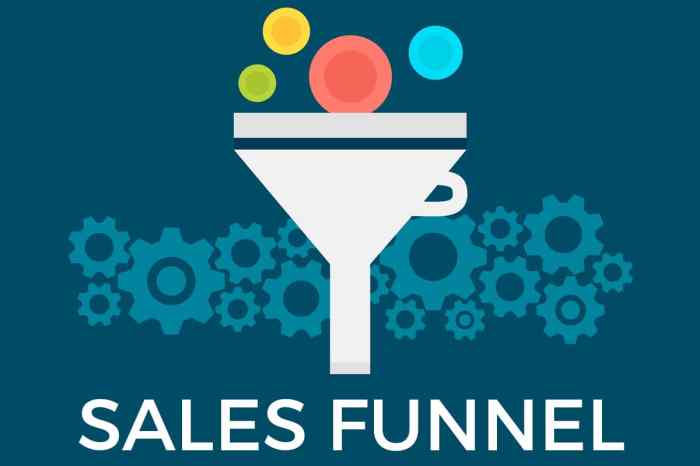
To create a successful sales funnel, you need to follow a series of steps that will guide your potential customers from awareness to conversion. Understanding your target audience is crucial in designing a sales funnel that resonates with them, and optimizing the funnel for better conversion rates can significantly impact your sales success.
Steps to Create a Successful Sales Funnel
- Identify your target audience: Conduct thorough research to understand your audience’s needs, preferences, and pain points.
- Create engaging content: Develop content that addresses your audience’s challenges and provides value.
- Build landing pages: Design landing pages that capture leads and guide them through the sales process.
- Implement email marketing: Utilize email campaigns to nurture leads and move them further down the funnel.
- Analyze and optimize: Continuously analyze your funnel performance and make adjustments to improve conversion rates.
Importance of Understanding the Target Audience
Understanding your target audience is essential in designing a sales funnel that speaks directly to their needs and desires. By knowing your audience’s demographics, behavior patterns, and preferences, you can tailor your messaging and content to resonate with them. This personalized approach increases the chances of converting leads into customers and building long-lasting relationships.
Optimizing a Sales Funnel for Better Conversion Rates
- Streamline the process: Simplify the steps in your funnel to reduce friction and make it easier for leads to convert.
- A/B testing: Test different elements of your funnel, such as CTAs, headlines, and images, to see what resonates best with your audience.
- Personalization: Tailor your messaging and content based on where the lead is in the funnel to provide a more personalized experience.
- Follow-up: Implement a follow-up strategy to re-engage leads who have shown interest but haven’t converted yet.
Tools and Technologies for Sales Funnels
Creating and managing sales funnels effectively requires the use of various tools and technologies. These tools help in designing, optimizing, and tracking the performance of sales funnels to ensure maximum conversion rates.
Popular Tools for Sales Funnels
- ClickFunnels: ClickFunnels is a popular tool that allows users to create and manage sales funnels easily. It offers a variety of templates and features to streamline the funnel building process.
- Leadpages: Leadpages is another tool that focuses on creating landing pages and lead generation. It offers A/B testing and analytics to optimize funnel performance.
- Kartra: Kartra is an all-in-one platform that includes features for building sales funnels, email marketing, and membership sites. It provides comprehensive tools for managing customer journeys.
Comparison of Software Options
When choosing software for building sales funnels, it is important to consider factors such as ease of use, pricing, integrations, and scalability.
| Software | Key Features | Pricing |
|---|---|---|
| ClickFunnels | Templates, A/B testing, email integration | $97 – $297 per month |
| Leadpages | Landing pages, A/B testing, analytics | $37 – $321 per month |
| Kartra | Sales funnels, email marketing, membership sites | $99 – $499 per month |
Role of Analytics and Tracking Tools, Understanding Sales Funnels
Analytics and tracking tools play a crucial role in monitoring the performance of sales funnels. These tools provide valuable insights into user behavior, conversion rates, and areas for improvement. By analyzing data from these tools, marketers can make informed decisions to optimize their sales funnels for better results.
